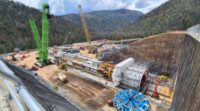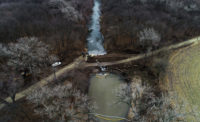Shelter-in-place rules, project shutdowns and social distance mandates spurred by COVID-19 have changed things in many cases for this year’s engineering and construction graduate hires and interns embarking on construction sector careers—with job commitments and work parameters changing for recruits and employers.
But even with full-time staff cuts and furloughs underway or possible, industry and talent are connecting, and along with schools, are adapting recruiting and work approaches.
Continuing financial and employment uncertainty is evident in new-hire trends for some industry employers, although sector and geography are differentiating factors.
Michael Horodniceanu, a professor at New York University’s engineering school and chair of its IDC Innovation Hub, says only 55% of civil engineering students have job offers in hand, which most received prior to the March shutdown of “non-essential” construction projects in New York, New Jersey and elsewhere. He says salaries will be 10% lower than in past years, and notes particular uncertainties for regional public-sector employers whose budgets are severely reduced and very fluid.
Lindsey Motley, career services specialist for the building program at Alabama’s Auburn University, cites a still robust hiring market for its mostly southeast based employers. Despite earlier virus-sparked uncertainty, “we had 100% job placement within two weeks of graduation,” she says. “A lot of companies are still looking to hire.”
Virginia Tech’s Myers-Lawson School of Construction surveyed employers in early April and found 88% moving forward with employment offers, with 12% still unsure. By May, only 2% had rescinded offers, says program director Brian Kleiner.
New Hire Impacts
Design firm Arup has not cut or furloughed staff, but still plans to lower next year’s recruiting by 30% to 40% “based on business need,” says Cheryl Petersen, head of its Americas region talent resourcing. Graduates hired will start in September instead of June.
But most employers are pushing to keep new hire commitments. “We have seen very limited rescinds for full-time offers for our graduates. Employers are trying to minimize the long-term negative impacts this pandemic would have on their overall recruiting goals,” says Stephanie Salazar-Kann, associate director of engineering career services at the University of Wisconsin-Madison. “Any employers that cut positions are hoping to return to hiring as soon as possible. They consider their new-grad hiring essential to their long-term outcomes, so they are trying to still make it work.”
“My internship employer [a Boston utility contractor that had to lay off 80% of its staff] could not justify a need for bringing interns on board.”
– Noah Jackson, Purdue University Junior, construction management
Most internship programs are still intact, although there have been casualties this year and changes forced by continuing virus restrictions.
Noah Jackson, a junior in Purdue University’s construction management technology program, had his internship cancelled when construction shut down the Boston base of his intended construction employer, a utility contractor that had to lay off 80% of its staff.
“They simply did not anticipate a need for interns and could not justify bringing us on board,” he says. “I am working as an equipment operator for a local construction company, as well as continuing my management consulting work with Purdue.”
Jackson says finishing his academic semester at home was “seamless,” although he notes spending “about 10-12 hours per day on my computer watching lectures, completing assignments, and participating in my various clubs.”
Auburn's Motley says while its industry partners are have had "few projects cancelled or halted," she has seen internships cancelled because of stay-home mandates affecting staff and students, new on-site distancing restrictions and liability concerns. "It's not because they didn’t have jobs." But she speculates on future job impacts from still unclear market changes "in six months."
While California electrical contractor Rosendin’s summer intern program has had up to 100 students on board in previous years, pandemic health and safety concerns forced the firm to cancel the 2020 program, says Julie Moss, human resources director. The firm is providing affected students with “scholarships” of $1,500 to $2,500 each instead, she says.
On the other hand, John Shaw, human resources vice president at Kiewit, says the pandemic "really didn’t affect our intern program since most of [our] projects were deemed essential. The contractor’s current group of about 860 interns is larger than its 2018 total.
But the firm is having to mix virtual project tours with on-site work as can be arranged. It has sent learning supplies and computers to interns who will work from home through mid month, with students moving to project sites based on Kiewit's monitoring of local pandemic conditions.
“We are trying to make the virtual program as realistic as possible for interns until we can potentially get them placed in the original assignment,” says Alicia Edsen, corporate safety director.
For contractor PCL, “recruitment and development of college students is crucial to continued growth” of U.S. operations, says Kate McGhee, regional human resources manager. She says its civil infrastructure business “has had minimal impacts from the pandemic, as work has been deemed essential.”
The Arizona Dept. of Transportation is one government employer able to maintain an intern program. “There has been no change in format, numbers or compensation due to the current public health situation,” says an agency spokesman, although he concedes a drop in hires this summer for reasons “that have nothing to do with” the virus, which he did not disclose.
New Thinking
With a 30% cut in its intern force this year, design firm Terracon tried some new technologies, says Stephanie Price, principal and HR director. “Thinking creatively, we’ve been able to approach these programs in an albeit slightly different manner and on a smaller scale,” she notes.
The firm have transitioned its intern toolkit to on an online platform using Articulate Rise, which hosts all learning objectives and activities. "We plan to host virtual 'lunch and learns' via Microsoft Teams for interns and their mentors, and with executive leadership," says Price. "We also have an intern-dedicated room to encourage interaction with others across the country. For hiring managers, the firm has used Microsoft Stream to create videos featuring subject matter experts from multiple locations in operations, safety, HR and technical areas to provide best practices on virtual hiring, onboarding and training.
“While in-person interaction with colleagues and clients will be different, we are also excited to be exploring how technology may make communication easier and more efficient," Price says. "We are conducting site safety check-ins using Terracon’s Site Safety Check-in app, Face Time and cameras.”
Arup’s Petersen says the firm has shortened its internship program to eight weeks from 10, but with all North American employees working virtually, “we seized the opportunity to reshape [it] with a virtual framework that supports online learning using cloud-based systems.”
Beth Lowry, executive vice president at Holder Construction, says the company made most offers to students before college campuses closed in March, but then pause its pursuits. With COVID-19 protocols in place for its jobsites, Holder cut its interns by about 25%, with work on project sites rather than in the firm's offices. “On construction sites, we have an environment we can control with proper PPE, social distancing and other strategies,” she says. “It’s been more difficult in our offices, where it’s leased tenant space dependent on a building owner."
For Sundt Corp., adapting to the pandemic "has forced us to be even more ambidextrous in our thinking and in our actions." says Senior Vice President Ryan Abbott, with interns set to have a key learning experience in coping with an unplanned situation. "We intend our next generation leaders to be innovative, curious, adaptive, master building critical thinkers," he says.
Clark Construction moved ahead with its entire class of 185 interns this summer, although the program has been significantly restructured.
Rather than stagger intern start dates, the firm brought all on board June 1. Clark interns start with a five-week intensive online program and the same online classroom-style sessions with company leaders, says Chris Jordan, vice president of talent acquisition. “After the five weeks, we will have an opportunity for almost anyone to come on a jobsite in July, assuming the conditions are right for it,” he says. But COVID-19 restrictions have impacted movement of interns to project sites due to travel and housing restrictions.
Given the intense effort required for its internship program, Clark will delay onboarding 150 new graduate hires until Aug. 1. “We’re still hiring, but more strategically now,” Jordan points out. The pandemic “has freed up our career staff to develop more proactive relationships with candidates to get ahead of future needs, rather than just reacting urgently.”
Limits to Virtual Work
Michael Baker International’s internship program is “moving full-steam ahead,” but with telework the corporate norm, “we have been faced with the challenge of interns not getting that face-to-face contact with their managers and project teams,” says Brian Rider, vice president of talent acquisition. “This has made regular and detailed communication more critical.”
While technology allows the firm to stay engaged with interns, Rider notes limits to virtual work, particularly the “social and cultural component associated with daily interactions … in an office.”
Skip Notte, vice president in Dewberry’s Charlotte, N.C., office, says another challenge is timing the onboarding with availability of work, with client slowdowns on projects assigned to new hires and interns delaying their onboarding.
“The pandemic has freed up our career staff to develop more proactive relationships with candidates to get ahead of future needs rather than just reacting urgently.”
– Chris Jordan, Vice President, Clark Construction
Virginia Tech's Kleiner says all the universities that the Myers-Lawson School works with plan to hold more traditional career fairs this fall, although with likely modified formats. Events would be spread across multiple days to accommodate distancing while most or all follow-up interviews with candidates would move to a virtual format. “I could see still making space available onsite for interviews, but I expect [companies] will choose to be more discriminating terms of who they really want to hire," he says.
But A. James Clark School of Engineering at the University of Maryland, College Park, will hold its first-ever virtual career fair later this month. Heidi Sauber, director of engineering career services, says 62 employers had signed up as of June 1.
The virtual career fair format will consist of a series of employer chat rooms, which students can enter to ask questions. Employers can access resumes of job candidates and invite them to a private chat room for further discussion. Potential bosses also will be able to video conference with individual candidates.
Looking Ahead
For engineering firm giant WSP, this year’s summer intern cohort of 193 is smaller than usual, and its mid-June start is a month later than normal, but the firm has “a rather extensive internship program" and has taken “aggressive steps to make sure we don’t miss a year,” says Jerry Jannetti, a senior vice president in its transportation business. He says some departments have reduced interns’ hours from 40 to 24 as work dried up. “Candidates are a little disappointed—they were hoping to make more money in the summer,” he acknowledges.
But for both students and the firm, it’s better than no program. “It’s not just an interview of a potential new hire, it’s an interview by the potential new hire of us,” Jannetti points out. He says the "virtualization" of internships allows all participants to see how potential future hires work independently, and there could be advantages.
“I would say the probability is high that we’ll have interns working from school when things get back” to normal, he says.
What "normal" will look like in the future is still a work in progress, with the virus likely to accelerate changes in construction education content delivery that have already begun.
"Look for a different engagement model to emerge, relying on both distance learning and contact learning ... that will provide for a higher degree of guided self-study," says management consultant Robert Prieto, also a former Fluor Corp. and Parsons Brinckerhoff top executive in a recent National Academy of Construction article. "Education will look to a different economic model built on lifetime engagement."
Jeffrey Russell, vice provost for lifelong learning at the University of Wisconsin, Madison, adds that "designing learning that leverages technology, whether on line or hybrid, requires varying levels of continuous improvement over time. It's not a one-and-done exercise."









Post a comment to this article
Report Abusive Comment